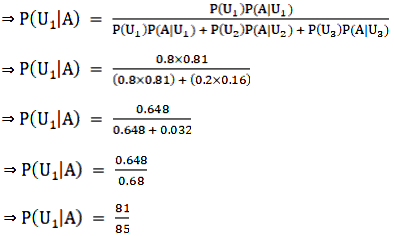Let us assume U1, U2 and A be the events as follows:
U1 = Machine is correctly set up
U2 = Machine is incorrectly set up
A = produce two acceptable items
From the problem
⇒ P(U1) = 0.8
⇒ P(U2) = 0.2
⇒ P(A|U1) = P(producing 2 acceptable items if machine is correctly set up)
⇒ P(A|U1) = 0.9 x 0.9
⇒ P(A|U1) = 0.81
⇒ P(A|U2) = P(producing 2 acceptable items if machine is not correctly set up)
⇒ P(A|U2) = 0.4 x 0.4
⇒ P(A|U2) = 0.16
Now we find P(U1|A) = P(Machine is correctly set up for producing 2 acceptable items)
Using Baye’s theorem:

∴ The required probability is \(\cfrac{81}{85}.\)